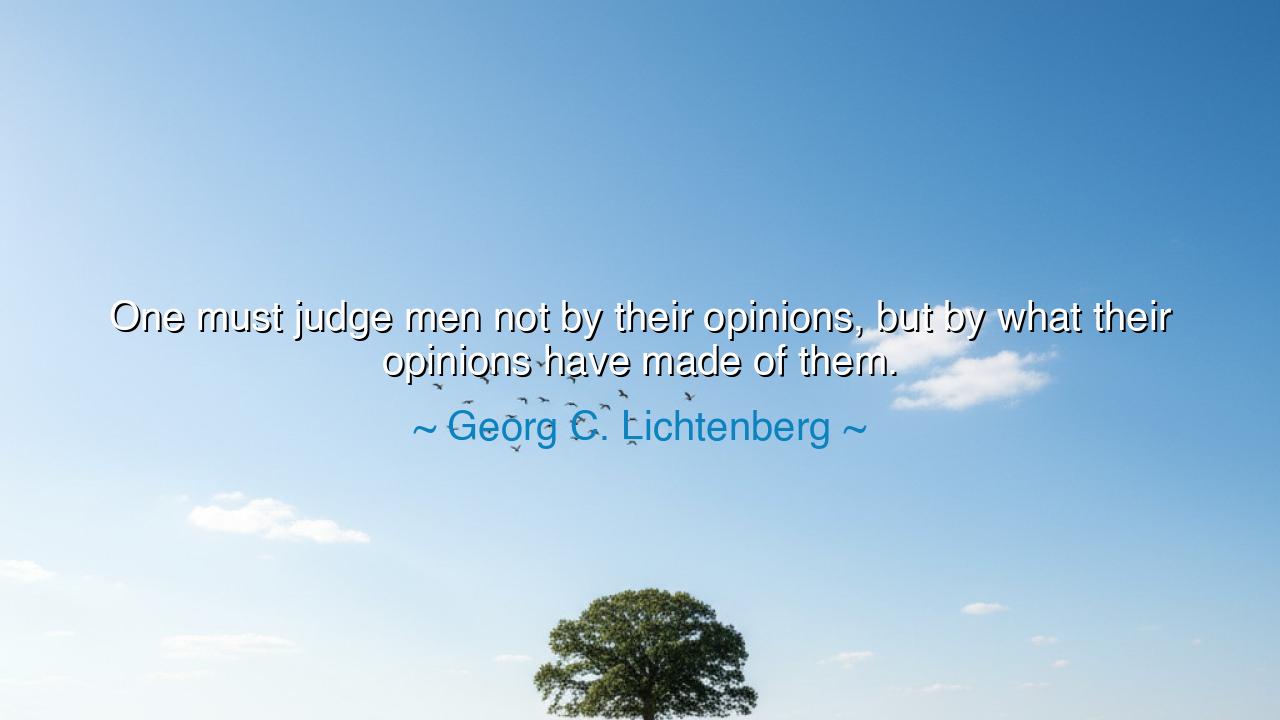
One must judge men not by their opinions, but by what their
One must judge men not by their opinions, but by what their opinions have made of them.






The words of Georg Christoph Lichtenberg fall like the counsel of an elder who has studied both men and time: “One must judge men not by their opinions, but by what their opinions have made of them.” In this maxim, he teaches us that ideas are not ornaments for the tongue, nor decorations for the mind, but seeds that grow into the character of a person. An opinion spoken may sound lofty, beautiful, or even wise, but its true weight is revealed only in the life it shapes, in the deeds it inspires, and in the spirit it nourishes—or corrupts.
The origin of this truth lies in the Enlightenment, an age when men delighted in argument, philosophy, and opinion-making. Lichtenberg, a satirist and thinker, lived among scholars and nobles who filled the air with endless words. Yet he, with sharp eyes, saw that opinions meant little if they bore no fruit. A man who declared belief in justice but lived in cruelty was not a just man; a man who proclaimed humility but lived in vanity was not humble. Thus, he warned that opinions must be judged by their fruits, by what they have wrought in the soul of the one who holds them.
The ancients also declared such wisdom. “By their fruits you shall know them,” said the scriptures, reminding mankind that it is not words but works that reveal the truth of a person. Socrates, too, pressed the Athenians not to speak endlessly of virtue, but to live it. He warned that fine opinions are empty if they do not carve the soul into something nobler. The Greeks called this arete, the excellence of being—not what a man says he believes, but what his life proves he has become.
History gives us countless examples. Consider Adolf Hitler, who clothed his opinions in fiery speeches of national pride and strength. Yet those opinions, once lived out, revealed themselves as monstrous, for they shaped him into a tyrant and the world into a field of suffering. Contrast this with Abraham Lincoln, who held the opinion that a nation “conceived in liberty” must not remain divided by slavery. That conviction shaped him into a man of endurance, humility, and vision, guiding a nation through its darkest trial. Thus, we see: an opinion is nothing by itself; it is everything in what it makes of the man.
This truth carries both warning and inspiration. It warns us not to be deceived by eloquence, by clever words, or by attractive philosophies. The measure is not in the sound of the opinion but in the life it produces. Yet it also inspires us to guard our own hearts, for every belief we hold will shape us in time. To nurture bitterness, prejudice, or pride is to fashion ourselves into something small and cruel. To nurture compassion, humility, and justice is to become noble, even if the world never hears our speeches.
The lesson for us is clear: let your opinions be judged not by their cleverness, nor by how they please the crowd, but by what they do to you. Ask yourself, “What kind of person am I becoming because of what I believe?” If your beliefs make you kinder, truer, stronger, they are worthy. If they make you harsher, prouder, or more blind, then they are chains, not wings.
Practical action lies before us: examine the opinions you hold. Do not polish them merely for debate or to impress others, but test them by their fruits in your life. Look also upon the opinions of others not as words to be admired or despised, but as windows into what kind of people those opinions have forged. And above all, cultivate beliefs that lead to virtue, that mold you daily into someone more courageous, more just, and more compassionate.
So let us carry Lichtenberg’s wisdom into our hearts: men are not to be judged by their opinions, but by what their opinions have made of them. For words fade like echoes in the air, but the life formed by belief endures, speaking more loudly than any tongue, and bearing witness to the truth within.






AAdministratorAdministrator
Welcome, honored guests. Please leave a comment, we will respond soon